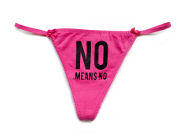The brand hoaxers are coming – are you prepared?
From pranksters on Facebook pretending to be from Jetstar to the spoof Greenpeace website, brands are falling victim to identity theft. And there’s not much they can do about it, argues Cathie McGinn
In his last novel, Dostoyevsky wrote: “a disturbance in one place is felt at the other end of the world.”
Which is why when I’d stopped laughing at the recent Victoria’s Secret “Pink Loves Consent” hoax, I put aside my sense of schadenfreude – Victoria’s Secret not being one of my favourite brands in the world – and considered what hoaxes and spoofs as sophisticated as this one might mean for brands.



Culture jamming has been around for a long time. Social media has just given these folk the audiences to have their voices heard and creative seen.
The media student in me find this fascinating. The marketer in me fears having to manage the fallout of events like these.
Interesting discussion though – Thanks for posting!
These multinational brands once salivated at the power the internet would bring them — it’s reach, accessibility, lower costs in comparison to other mediums. Now they’re having to grasp the fact that consumers and activists alike have got access to these same resources.
I think it’s great that powerful brands can be forced to sit up and pay attention to issues that once might have never seen the light of day, or which might have quietly dissipated.
Great post, interesting topic. I suspect two things will have a bearing though:
1. Consumers’ BS detectors are moving to “always on” mode and their first response will likely be “It’s probably dodgy” until convinced otherwise. There was a recent piece declaring that the initial note you receive in the Nigerian scams are intentionally suspicious so anyone apart from the most gullible will delete it straight away. If they get a response, they know this person must be super-gullible.
2. This shouldn’t happen if your brand has a very strong and recognised personality.
Cathy, it’s good see that Victoria’s Secret isn’t “one of your favourite brands”. There is a lot to be said for gals who go commando.